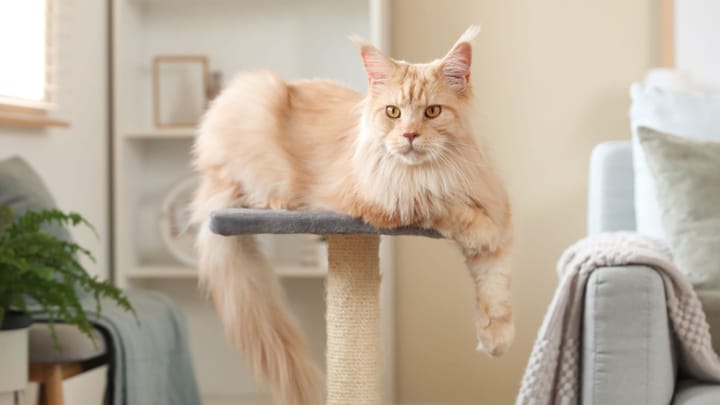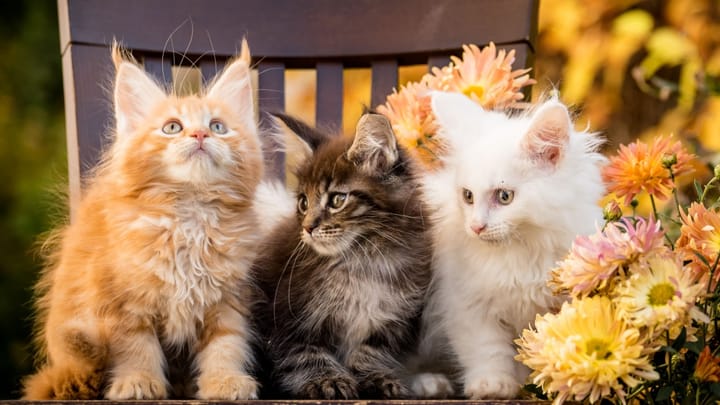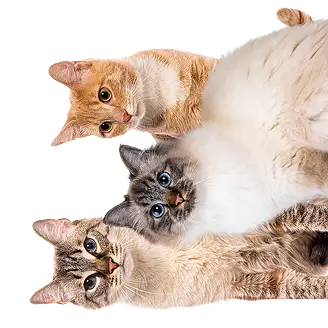Maine Coon
Other name: American Longhair


Maine Coons are giants among domestic cats. They’re truly enormous, tall, and strong. They resemble a Lynx due to their dense coat and the brushes at the tips of their ears. Despite having mysterious origins, they are considered by many to be the first American cat breed. Always lively and sweet, they are incredible companions and are affectionately nicknamed Big Friendly Giants by families who own these enormous teddy bears!
|
Life expectancy |
The Maine Coon has a life expectancy of between 11 and 13 years |
|
Temperament |
|
|
Adult size |
Female
Between 8 and 14 in
Male
Between 10 and 16 in
|
|
Adult weight |
Female
Between 9 and 13 lb
Male
Between 11 and 18 lb
|
|
Coat colour
Black / seal, blue / grey-slate, red, white Chocolate, lilac, fawn and cinnamon are excluded. |
Black White Red Blue |
|
Type of coat
Long, mid-length. |
Long |
|
Eye colour
Blue and odd eyes are only accepted when the Maine Coon is white-coated. |
Blue
Green
Yellow
Odd-eyed
|
|
Purchase price |
The Maine Coon costs between £300 and £500 |
Maine Coons takes their name from an ancient legend that states that domestic cats from the state of Maine (USA), crossbred with racoons. This crossbreeding is obviously impossible from a biological point of view, as the two species are too different from a genetic standpoint to breed together.
Find out 5 cool facts about the Maine Coon, some of them you won't believe!
More details about the Maine Coon
Maine Coon: Origins and history
Even today, the true origin of this breed in many respects remains unknown. According to some, its history begins in New England, when the first European ships docked on the shores of the New Continent. Cats escaped from the boats and took refuge in nearby forests. Over the years, their descendants adapted to the rigours of North America: making them bigger, more powerful, densening their fur, etc. These cats then crossbred with cats of different breeds from overseas. Then, in the nineteenth century, specimens from this crossbreeding were presented in competition and were a sensation.
Other stories suggest different origin stories for Maine Coons. Nevertheless, the breed was a great success at its first cat shows in 1860-1861. A few years later, Persians and Siamese appeared in America and stole the show completely. It was not until the 1950s that Maine Coons came back into fashion. Since then, the breed has been spreading ... to the delight of their fans!
Physical characteristics of the Maine Coon
Maine Coons are definitely one of the biggest breeds of cat. They are massive, powerful and muscular. Their large, slightly rounded heads have square muzzles and strong chins. Often tipped with ‘brushes’ (also called lynx tips), their ears are similar to those of a lynx. Their fur is dense and lustrous. To be honest, the body shape of this breed is spectacular. They have absolutely no equal!
Maine Coon: Characteristics
Maine Coon: Behaviour
Breed compatibility Maine Coon
Maine Coon: Purchase price
A Maine Coon kitten costs between £300 and £500. However this price can vary depending on their lineage, breeding, age and sex. They cost around £35/month to provide for, which will guarantee them medical care and a good quality diet to keep them in good health.
Maine Coon: Shedding
Heavy !
They lose more hair in certain seasons, so the length and thickness of their coats varies over time.
Maine Coon: Grooming
American Longhairs’ fur is fine and silky, it requires regular maintenance to prevent the formation of knots.
Maine Coon: Health
On average, Maine Coons live 11 to 13 years of age, but they can sometimes reach the ripe old age of 15.
Their long coat and dense undercoat give them good resistance to thermal variations and extreme temperatures. In addition, their coats are waterproof.
Risk factors for feline obesity include: age, environment, diet and activity. The risk of the cat becoming overweight decreases considerably when their physical activity needs are met. Providing food in interactive bowls can also help ration portions.
Annual medical checkups are suggested to ensure their well-being. They can suffer the same diseases as domestic cats, including oral diseases. They are also known to have certain hereditary diseases, including:
- Spinal muscular atrophy - typical hereditary disease among Maine Coons. It arises after 13 to 17 weeks and muscle weakness is a main symptom.
- Feline hypertrophic cardiomyopathy is a disease that affects both purebred and non-pedigreed cats. Eventually, it causes heart failure.
No crossbreeding is allowed.
On average, litters consist of 3 kittens.
Do you want a Maine Coon cat ?
Frequently asked questions
Are Maine Coons good pets?
The Maine Coon is one of the biggest breeds of domestic cat and is often called "Gentle giant" because of its size and character. Indeed, this feline is very affectionate, loves to play, adores being close to its owner and gets on well with other pets (if introduced correctly) and with children.
Are Maine Coon cats expensive?
A Maine Coon kitten can cost between £300 and £500, but this price can vary depending on their lineage, breeding, age and sex. It will cost around £35/month to provide for this breed (medical care and a good quality diet).
Why are Maine Coons so big?
Maine Coons are big because they mature slowly allowing them to develop a larger bone structure and muscles. They reach adult size at around 3 to 4 years old while other cats stop growing after 12 months. A female cat's size is between 8 to 14 inches and a male cat's size is between 10 to 16 inches.
Do Maine Coons like to cuddle?
Maine Coons are very affectionate cats and yes, they love to cuddle and stay close to their owners. Actually, this cat breed is often described as "dog-like", imagine that, a dog in a cat's body? You might hear him bark next.
Do Maine Coons like water?
Yes, Maine Coons love water! In fact, they are excellent swimmers and will enjoy their bath time (if needed).
Find out if a cat can swim and which cat breeds can actually swim









